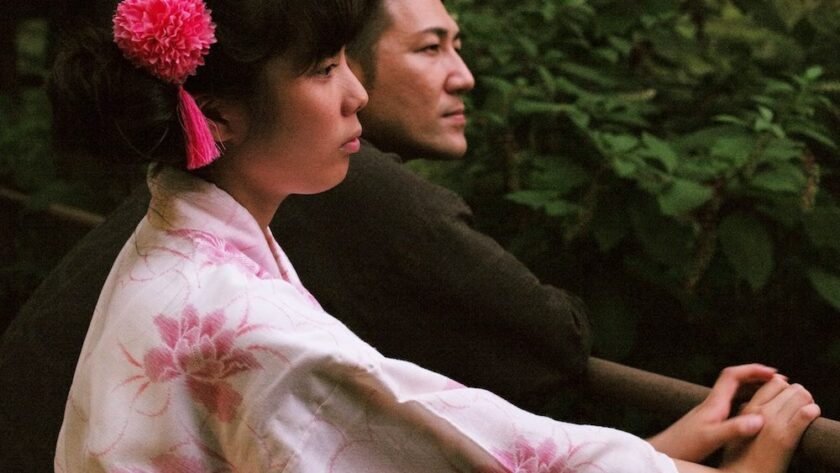Milo Garner reviews Werner Herzog’s intimate new film at BFI LFF 2019.
Werner Herzog has a penchant for representing the alienated. His great films of the ’70s and ’80s have always centred on those who have lost touch – or who have never been in touch – with the world around them: the raving king Aguirre stumbling on his forsaken raft; the vampire Nosferatu, reduced to a lovelorn welp; the wandering, ever-lost Stroszek drifting through the hinterlands of America. Even in his more conventional output – not least the Nicholas Cage vehicle Bad Lieutenant: Port of Call New Orleans – his protagonists seem a step removed from their reality. Herzog himself might be described similarly. He is by no means a loner, nor a reject – few rejects nab a guest spot in The Simpsons, let alone a role in the latest Star Wars project – but nonetheless he seems to share something of the errant madness that infects many of his leading players.
His latest film Family Romance, LLC considers alienation from its inverse. It concerns Ishii Yuchii, the founder of the eponymous company, which provides a rental service for family members and friends. Though much like something pulled from a Charlie Kaufman script, this company is genuine, and while the incidents in the film are largely scripted, they often drift into the realm of documentary – a realm in which Herzog is, of course, immersed. The Japan of his film, and, by extension, the Japan of reality, is a country wherein alienation has become the norm – a country in which a company like Family Romance not only exists, but feels much at home. This film is sci-fi, dystopian, but not with much need to invent or fabricate.
The aesthetic of the film is notable in this respect. Shot on a handheld digital camera (operated by Herzog himself, with additional footage from producer Roc Morin), a visual style reminiscent of low-budget filmmaking techniques pervades throughout. The privilege of Herzog’s name is difficult to ignore; had a new director submitted a film of this technical quality, there is little chance his film would feature at such a prestigious festival as LFF.
However, this low-quality style – the rollicking, imprecise camerawork of an aging director using a relatively cheap camera – suggests a distinctly relevant aesthetic question. Considering the fictional premise, the imprecision implies an artificiality, as though the means of this film’s making are constantly revealed and thus a constant reminder of its untruth. This artificiality is then complemented by its opposite: much of what takes place in the film is inescapably real. An extended scene of children playing with and petting a hedgehog is essentially documentary, as is the sequence of crowds gathering around a certain stunt pulled in the middle of the film. In these moments the ramshackle production no longer suggests falsity, as though the film exists on a thin line between an unconvincing fiction and an uncomfortable reality. No doubt much of the amateurism is a result of inexpert hands and low budget, but the effect suggested by these choices synthesises with the film otherwise closely and consistently.
The narrative of the film follows Ishii Yuchii – played, naturally, by himself – as he completes various jobs for his company. The most significant is to fill in as someone’s ex-husband, acting as a returned father to a young Mahiro (too young to recognize true- from false-dad). The ethics here are obviously sketchy, but more distinctly interesting is the question of affect. The happiness Mahiro experiences with her faux-father is no less ‘real’ than it would have been with her actual (and still absent) father.
This conclusion leads to the further observation that so much of the modern world is constructed through falsehood. Instagram is briefly mentioned (though not with the dismissive grimace of an angsty boomer; Herzog’s interest in burgeoning tech has aged him well). In this increasingly pervasive online sphere, reality and unreality are becoming more indistinct. In a chemical sense – the sense of dopamine and serotonin – the actions of Ishii Yuchi and his company could be considered noble. They are providing happiness where it would otherwise not exist. They are perhaps not a symptom of an increasingly isolated world, but its cure – the first step towards a future where artificiality and authenticity are intertwined and indistinguishable. This idea is not far from Kiarostami’s Certified Copy, a film that considers a similar ground to Family Romance, LLC, if more elegantly.
This sentiment, however, does suggest an unease – perhaps an orientalist, exotic discomfort for a Western observer. This burgeoning culture peals like a cheap sci-fi novel, and not one of the utopic bent. Herzog, while generally reserved in his judgement, seems to sympathise with this assessment; his inclusion of ‘LLC’ in the title, as noted by Peter Debruge for Variety, seems an ironic undermining of the two words prior. Eric Kohn, writing for Indiewire, further suggests that the film engages in a subtle critique of such widespread and all-consuming capitalism as Family Romance requires, in which commerce now encompasses friends, family, and love – all things that money supposedly cannot buy.
For Herzog, though, love is the problem. To quote the late Daniel Johnston, ‘true love will find us in the end,’ and this film proves no different. The dramatic crux – late in arrival but no less affective – concerns Ishii Yuchii and the realisation that he has begun to develop a genuine affection for his surrogate daughter. This is calamitous for his work. The ghost in the machine is just that – the artificiality of this new world can only function so long as its purveyors remain genuinely detached and unaffected. This, Herzog supposes, quite contradicts the human spirit.
While this is the lasting impression, it is not a conclusion entirely. Earlier in the film, Herzog follows Ishii Yuchii into a ‘robot hotel’ – a gimmick establishment in which the hotel staff and even its fish are robots. Herzog here suggests a cyborg future in which capitalist service might circumvent the foibles of human limitation. Even then, the director is wont to consider beyond this bleak premonition. Speaking a line that can be read in no voice but Herzog’s, Ishii asks the hotel’s (human) proprietor whether robots can dream – a throwaway ‘shower thought,’ for the moment. More so, however, this is Herzog thinking beyond the gimmickry of contemporary robotics. True love will find us in the end, sure – but perhaps it’ll find them, too. A scrappy, micro-budgeted, and inconsistent docu-drama, Family Romance, LLC rests far from Herzog’s most compelling output, but it is nonetheless a cogent, even affecting investigation of concepts central to humankind’s present and future.







